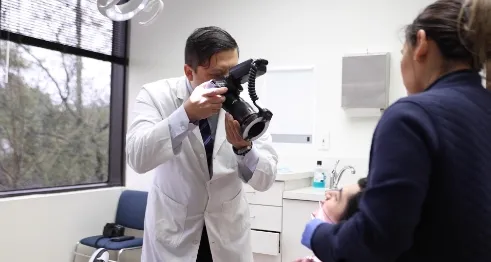Oral Cancer Screenings Houston
Protect Your Smile & Your Life with Preventive Screenings
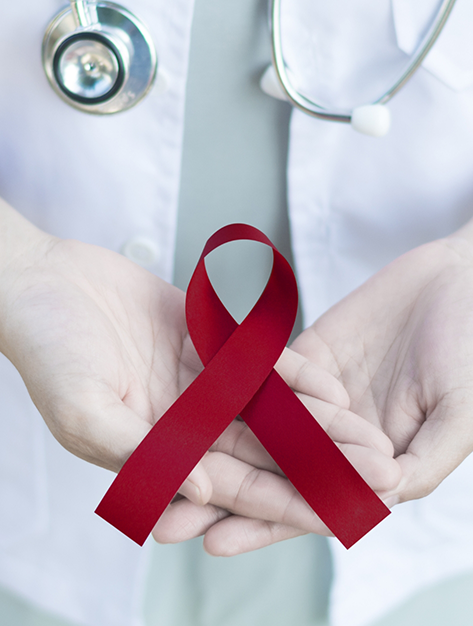
Oral cancer probably isn't something you think about very often -- but if you knew the facts surrounding this disease, you might. For starters, it's not rare. Approximately 132 new individuals are diagnosed with oral cancer every day in the United States alone, according to the Oral Cancer Foundation.
Visiting a dentist or specialist for routine screenings can improve the chances that, if you do have oral cancer, you will receive an early diagnosis and have a much higher chance of successful treatment. Talk to the team at Piney Point Oral & Maxillofacial Surgery of Houston to find out how frequently you should get an oral cancer screening based on your specific risk of this disease. The team is happy to provide screenings, diagnosis, and treatment of oral cancer in Houston, so don’t hesitate to get in touch today!
Why Choose Piney Point Oral & Maxillofacial Surgery of Houston for Oral Cancer Screenings?
- Team of Specialists with Unmatched Credentials
- Oral Cancer Screenings & Treatments Performed In-Office
- Both Dental & Medical Insurance Welcome
What Is Oral Cancer?

Like other cancers, oral cancer is an uncontrollable growth of cells that spreads and damages the surrounding tissues. It can be found in the mouth and the surrounding structures, including the lips, tongue, cheeks, floor of the mouth, hard or soft palate, sinuses, and throat. Oral cancer is the eighth most common cancer in the world, and it can be life-threatening if not diagnosed and treated early. However, the five-year survival rates for oral cancer are extremely high when detected in its earliest stages, which is easy to do with regular dental checkups.
Who Is at Risk of Getting Oral Cancer?

While oral cancer can affect people of any age and gender, there are certain risk factors which can dramatically increase the odds that you will develop this disease. If one or more of the following is true about you, you may need to undergo more frequent oral cancer screenings:
- Smoking and tobacco use
- Heavy alcohol consumption
- Frequent and prolonged UV exposure
- History of human papillomavirus (HPV)
- A family history of cancer/oral cancer
-
Older age
Symptoms of Oral Cancer
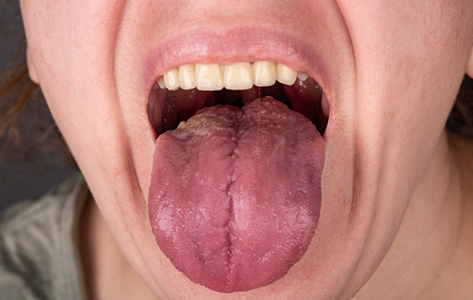
Experts report that the high death toll associated with oral cancer isn’t because the disease is particularly deadly, but because it often goes undetected for too long. During your routine dental checkups, your dentists will always check for the most common warning signs of oral cancer to help catch it as early as possible. Between your biannual visits, keep an eye out for these common warning signs of oral cancer:
- Lesions or sores that do not heal after two weeks
- Discolored areas (white, pink, red) in the mouth
- Lumps or bumps in or around the mouth
- Rough patches
- Asymmetries in the face or mouth
- A change in the tone of voice
-
Any other irregularities in the mouth
Oral Cancer Screenings & Treatment
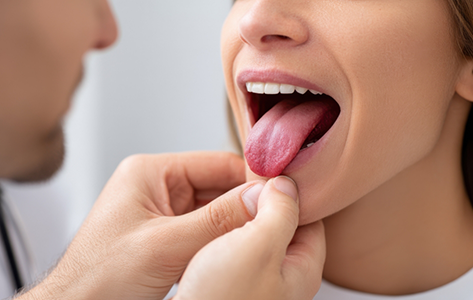
Studies show that the earlier oral cancer is diagnosed, the more likely it can be successfully treated. That’s why the team at Piney Point Oral & Maxillofacial Surgery of Houston recommends getting an oral cancer screening at least once a year. It is a quick procedure that doesn’t cause any pain or require anything on your end. Simply be prepared to discuss your oral and overall health and any changes you may have noticed in your mouth lately. After this brief but thorough discussion, Dr. Koo or Dr. Weil will perform a visual and tactile examination of your mouth and oral structures. Although oral cancer screenings are quick and simple, they can potentially save your life!
The Benefits of Routine Oral Cancer Screenings

Early detection of oral cancer can increase the likelihood of successful treatment by up to five times! That alone makes getting routine screenings for this disease an absolutely logical thing to do. However, there are plenty of other benefits oral cancer screenings offer as well, including:
- Oral cancer screenings are non-invasive and potentially life-saving
- Some dental insurance plans cover oral cancer screenings
- You don’t have to do or wear anything special to undergo an oral cancer screening
- The exam can be completed at the end of a routine appointment
- Biopsies can be tested immediately or after two weeks, depending on the severity
- Getting regularly screened can decrease the cost of oral cancer treatment when the disease is detected early
What Happens If Any Signs of Oral Cancer Are Detected?
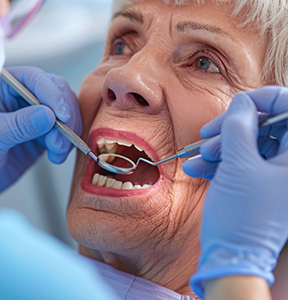
Your oral surgeon in Houston will perform a quick oral cancer screening every time you see them, and if a suspicious area is detected, they will discuss your next steps in the very same appointment. Persistent lesions should be biopsied right away for a proper diagnosis. For other, less serious warning signs, they may recommend you come back in a couple of weeks to see if the area has healed or changed.
If you ultimately end up needing a growth removed from your mouth, oral surgeons are more than qualified to handle the procedure. For particularly large cancers, they can reconstruct the jawbone as well to help you maintain their normal appearance and function. No matter what you need, you can feel confident knowing you have a capable team of experts on your side.
How Often Should You Be Screened for Oral Cancer?

Most adults should have an oral cancer screening at least annually. This is the best way to ensure that if oral cancer does develop, it can be detected and treated early. Patients who are at a higher risk of developing oral cancer, including smokers/tobacco users, people with a family history of oral cancer, and those who have HPV or have had oral cancer before, may need to have more frequent screenings from their oral surgeons in Houston. If you have never had an oral cancer screening or if it’s been a while since you were last tested, it’s highly recommend that you contact Piney Point Oral & Maxillofacial Surgery of Houston to book an appointment.
Minimizing Your Risk of Developing Oral Cancer

You can reduce your chances of developing oral cancer if you avoid tobacco products, do not overconsume alcohol, eat a healthy diet, and always use proper sun protection.
If you ever notice any suspicious areas in your mouth, or your dentist performs a screening and suggests that you get a biopsy, take prompt action! The sooner you get a diagnosis, the sooner you can visit a team of oral surgeons in Houston to get treatment underway. Then, you can get on the road to recovery, and hopefully, suffer minimal consequences to your quality of life.
How Much Do Oral Cancer Screenings Cost?
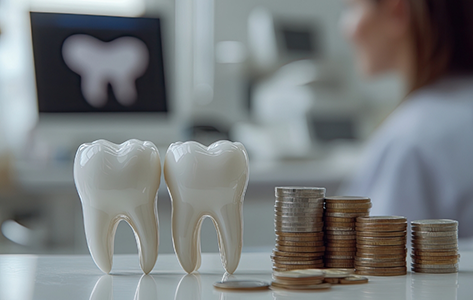
The cost of an oral cancer screening depends on many different factors. For instance, some dental insurance policies cover preventive care like oral cancer screenings at 90-100%. However, if you don’t have dental insurance or adequate coverage, oral cancer screenings are still usually very affordable given their value. Talk to your Houston oral surgeons about what you can expect to pay. Without any insurance, an oral cancer screening will typically cost less than $100, usually ranging between $40 and $70. That price is well worth it for protection against the disease that claims the life of one person per hour in the United States.
Oral Cancer Screening FAQs
What Exactly Happens During an Oral Cancer Screening?
An oral cancer screening is easy, fast, and painless. You will sit comfortably while we (or your general dentist’s team) examine your mouth, tongue, gums, and throat. We will look for any unusual sores, lumps, or red and white patches. Our team may gently feel the tissues in your mouth and neck for any abnormalities that are not visible to the eye.
We may also ask you about relevant lifestyle factors that might contribute to the development of oral cancer. If you have experienced any unusual symptoms lately, such as a persistent sore throat, difficulty swallowing, or changes to your voice, be sure to let us know.
Can I Screen Myself for Oral Cancer?
You can look for unusual sores, lumps, or patches in your mouth when you brush your teeth. You may use a mirror and good lighting to check your tongue, gums, and cheeks. However, some symptoms are not easy to spot without professional experience and equipment.
Even if you are diligent about monitoring yourself for signs of cancer, it is still important that you visit a professional for regular screenings. Our team has the training and tools to detect early signs of oral cancer that you might miss. Early detection is very important for successful treatment and peace of mind.
If My Screening Reveals a Cause for Concern, What Are the Next Steps?
If we notice something unusual during your screening, we will explain our findings clearly and answer your questions. We may recommend a biopsy to collect a small sample of tissue for further testing. This step helps us determine whether the area is cancerous or benign.
If a cancer diagnosis is confirmed, we can discuss what happens next. In some cases, the cancer can be eliminated via a surgical procedure in our office that removes the abnormal cells. In other instances, such as where the cancer has spread, additional treatment may be necessary. For example, chemotherapy and radiation are sometimes used.
How Quickly Does Oral Cancer Spread?
Oral cancer can progress at different rates depending on its type and location. Your overall health can also play a role in the disease’s advancement. Some cases of cancer develop slowly while others advance more rapidly.
If you have some abnormal tissues, you should not decide that the problem will spread slowly. Rather, a sense of urgency is important because early treatment can make a life-and-death difference!
What Can I Expect During and After Oral Cancer Surgery?
During oral cancer surgery, you will receive local anesthesia and possibly sedation for your comfort. Our surgeons will carefully remove the cancerous tissue while protecting as much healthy tissue as possible. The procedure may vary based on the cancer's size and location.
After your procedure, you may need some time to recover and adjust. As your oral surgeon in Houston, we will provide you with detailed care instructions and schedule follow-up visits to monitor your healing. Later, depending on the extent of your original surgery, you might need additional procedures to repair the shape and function of your mouth and jaw.
Wisdom Teeth Extraction Oral & Maxillofacial Pathology Orthognathic Surgery Dental Implants Pre-Prosthetic Surgery Facial Trauma Treatment Apicoectomy Surgery Cleft Lip & Palate Surgery TMJ Treatment Corrective Orthodontic Surgery Sleep Apnea Treatment Cosmetic Facial Treatments Anesthesia & Sedation Dentistry Emergency Dentistry View Our Services

